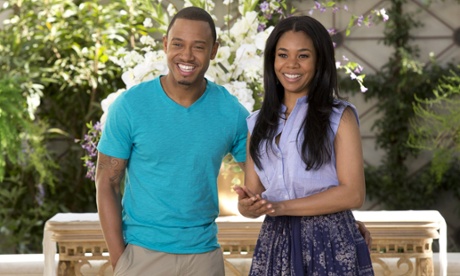
With its sparky, battle-of-the-sexes storyline and spiffy tailoring, Boomerang, the 1992 Eddie Murphy comedy, seemed cut from the same cloth as Howard Hawks’s 1940 classic, His Girl Friday. At the time, however, some critics were reminded of genres other than screwball comedy, derisively labelling the film “fantasy” and “science fiction” for its portrayal of upscale black professionals living and loving in a world where white characters were largely sidelined.
Twenty-two years on, the black romcom may seem less futuristic (movies such as Jumping the Broom and Baggage Claim having gone far less boldly where Boomerang went before), but when executed successfully, they are – in a marketing sense, at least – still comparable to Hollywood’s latest CGI showcases, with African-American audiences as excited to see relatable black characters battle bedroom disasters and embarrassing parents as they are superheroes facing giant lizards or alien invaders.
Think Like a Man Too – the sequel to the 2012 hit, whose likeable ensemble included Michael Ealy, Regina Hall, Taraji P Henson, Gabrielle Union and omnipresent funnyman Kevin Hart – was released in June in the US (and arrives in the UK later this month), its backers clearly confident that an under-serviced black audience would be awaiting it as fervently as any encores for Captain America or Optimus Prime. It can’t have hurt their confidence when Ealy, Hall and Hart scored on Valentine’s Day weekend with About Last Night, which, by serving up a raunchy, all-black remake of the 1986 Brat Pack staple, was both a rare instance of a remake done right and a sad indictment of black American’s long march to romcom equality.
And while the Vegas-set Think like a Man Too failed to outstrip its predecessor ($65m compared with $91m), there are still signs that the black romcom is as worthy of tent-pole status as Hollywood’s more traditionally fantastic fare. This summer’s Sin City: A Dame to Kill For, in which Robert Rodriguez and Frank Miller revisited the original’s bloody, hyper-stylised comic book universe after a nine-year break, was completely ignored by audiences. By contrast, the African-American ensemble of 2001’s nuptials comedy The Best Man reunited last year for festive sequel The Best Man Holiday, which doubled the original’s $35m domestic take.
In fact, never mind sci-fi or comic book movies: showcasing its nine gorgeous fortysomething stars, the poster for The Best Man Holiday looks like a black romcom version of an Expendables one-sheet; a constellation of African-American stars who, while not handed the blockbusters like the Washingtons (Denzel or Kerry), have remained stalwarts of the type of rom§com exemplified by the original movie. Sanaa Lathan (Brown Sugar, The Wood, Love & Basketball) is the movement’s Meg Ryan, which probably makes Taye Diggs, her love interest here and in Brown Sugar, its Tom Hanks. Then there’s Nia Long (Love Jones) and Think Like a Man alums Hall and Morris Chestnut.
It’s not just the hard-grafting leads that connect these two sequels, either. Playing to their audiences with a focus that would make Michael Bay proud, both films ensure that even their white cast members have pedigree in black movies: The Best Man Holiday hooks Long up with Eddie Cibrian, who starred alongside Union in Tyler Perry’s Good Deeds and Chestnut, Henson and Hart in Not Easily Broken (he re-teamed with Perry and Long this Spring in The Single Moms Club), while Think Like a Man Too complements the returning Jerry Ferrara and Gary Owen – a white standup beloved by black audiences – with Baggage Claim’s Adam Brody and The Single Moms Club’s Wendi McLendon-Covey.
And, of course, like the biggest action blockbusters, the Best Man movies strive to one-up each other in the set-piece stakes. Where The Best Man Holiday had the fellas entertaining the ladies by lip-synching to New Edition’s Can You Stand the Rain, Think Like a Man Too has the ladies recreating Poison by New Edition spin-off group Bell Biv Devoe, complete with a cameo from Ronnie DeVoe. Still, The Best Man franchise will have a chance to fire back when The Best Man Wedding opens in 2016.
Almost inevitably, Hart and Union also appear in Top Five, the Chris Rock comedy that recently romanced the Toronto international film festival (for which Paramount ponied up a Tiff-record $12.5m for worldwide distribution rights). In Top Five, writer-director Rock plays a disillusioned comedy superstar who, bracing for his wedding to a reality star (Union), wanders New York with Rosario Dawson’s charming profile-writer. If Top Five ostensibly evokes Judd Apatow’s Funny People, it’s also indebted to vintage Woody Allen, specifically the fame-gone-rancid ruminations of Stardust Memories and, in the building flirtation between Rock and Dawson, Annie Hall.
It’s not the first time that Rock, an avowed Allen fan, has channelled his idol – his remake of Eric Rohmer’s 1972 French film Love in the Afternoon in the self-directed 2007 rom com I Think I Love My Wife was distinctly Allenesque – but the fact that he now seems to have nailed Annie Hall while essentially playing himself – as opposed to a ghost or accidental presidential candidate as per the ill-fitting, high-concept comedies that followed his late 90s stand-up breakthrough – again speaks to the effectiveness of recognisable black characters negotiating matters of the heart.
Adding to the authenticity is Top Five’s use of hip-hop. Whether dispensing rap nerd one-liners (Charlie Chaplin as “The KRS-One of comedy”) or crowd-pleasing cameos (rabble rousing rapper DMX is employed as affectionately as rabble rousing rocker Billy Idol was in The Wedding Singer), Top Five is giddy in its reverence for the culture. The sight of Rock’s pal Jerry Seinfeld making it rain to Future’s Same Damn Time provides an apt, if unintentional, metaphor for the way in which Rock’s movie makes the white mainstream meet it on its own terms. Only Rock and Seinfeld themselves can tell us whether that particular scene is the stuff of fantasy.

